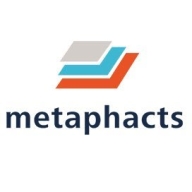

SUSE Linux Enterprise and metaphactory compete in the enterprise software market. SUSE Linux Enterprise seems to have the upper hand in pricing and support, whereas metaphactory provides specialized features for comprehensive knowledge graph solutions.
Features: SUSE Linux Enterprise is recognized for robust security, high reliability, and impressive scalability, making it ideal for complex enterprise environments. Metaphactory is notable for its advanced features in data integration, semantic search, and effective knowledge graph management, which benefit organizations needing sophisticated data processing capabilities.
Ease of Deployment and Customer Service: SUSE Linux Enterprise is praised for its flexible deployment across multiple environments and extensive support services that meet enterprise requirements. Metaphactory provides quick deployment tailored to semantic applications, with services focused on supporting specific use case implementations. SUSE's deployment adaptability contrasts with metaphactory’s niche focus on semantic technologies.
Pricing and ROI: SUSE Linux Enterprise typically offers a more attractive initial setup cost with a favorable ROI due to its broad industrial applicability. Metaphactory may require a higher upfront investment, reflecting its niche in semantic solutions. However, its cutting-edge capabilities can justify the expense through enhanced data utility and integration over time, aligning with distinct financial considerations for each product’s functionalities.


Improve data literacy across the enterprise. Out-of-the-box, intuitive interfaces for searching, browsing & exploring your Knowledge Graph.
Capture hidden expert knowledge in your semantic knowledge model. Visual ontology modeling for domain experts & business users; Taxonomy & Dataset management.
Build Knowledge Graph applications to match your enterprise requirements. Low-code approach to building custom interfaces that enable business-user interaction with the Knowledge Graph.
SUSE Linux Enterprise offers features like YaST for server management, seamless integration with Oracle and SAP, and a robust security setup. Renowned for stability, it efficiently supports workstations, SAP workloads, and cloud migrations across diverse industries.
SUSE Linux Enterprise is known for its lightweight design, high performance, and ease of installation. Its flexible architecture supports extensive documentation and efficient patching. The system uses the BTRFS file system for effective virtualization, and community support is significant. However, challenges include package updates causing conflicts, difficult initial setup and software management, high pricing, and support response times. Improvements in security compliance, cloud integration, hardware compatibility, and documentation are also needed.
What are SUSE Linux Enterprise's important features?Industries like healthcare and banking use SUSE Linux Enterprise for secure transactions and structured application deployment. It is also a choice for organizations involved in testing, automation, and web development, offering support for SAP HANA integration and facilitating cloud migrations.
We monitor all AWS Marketplace reviews to prevent fraudulent reviews and keep review quality high. We do not post reviews by company employees or direct competitors. We validate each review for authenticity via cross-reference with LinkedIn, and personal follow-up with the reviewer when necessary.